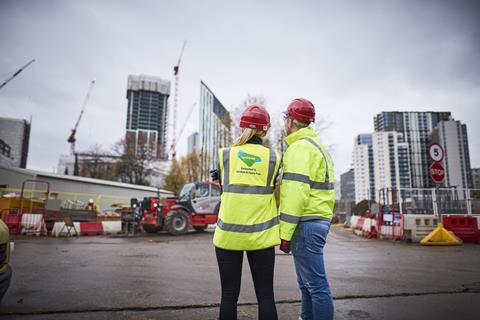A sale has to happen quickly or staff will leave and jobs will disappear, say rivals. Dave Rogers looks at the implications of the decision to sell up – or shut down

For most of Lendlease’s 700 staff in the UK, the first they heard that the business they worked for was up for sale was over the bank holiday weekend at the end of last month.
A story would be appearing in the Australian financial press on Monday morning – the country is nine hours ahead of the UK at this time of year – reporting that Lendlease was retrenching and pulling out of overseas markets, including the UK and US, to concentrate on its domestic business.
Staff were briefed about the news that weekend, leaving some to wonder about the timing of the announcement given that it was also a public holiday in the US as well.
Over the course of a 47-page strategy document, Lendlease pretty much said the following: the decision was being made because it had had enough of seeing its share price tank, was fed up with low margins overseas, was exasperated by the time that projects were taking to get through planning and was, instead, going to concentrate on the market it knew best – Australia.
“They had to do something, otherwise they might have become a takeover target,” said one UK client.
There are a lot of CVs in the marketplace. As soon as it was announced, we had people on the phone from Lendlease
Employees in the UK woke up on bank holiday Monday to read quotes from their Sydney-based chief executive, Tony Lombardo, saying that this was a “necessary but tough decision”.
Predictably, it has not gone down well with staff based on sites such as the Google headquarters building at King’s Cross and the Manchester Town Hall refurbishment job, as well as those head office staff billeted in their relatively new Paddington office, having moved there two summers ago from Regent’s Place at Euston.
“A lot are miffed,” says one senior executive at a rival contractor. “There are a lot of CVs in the marketplace. As soon as it was announced, we had people on the phone from Lendlease.”
Another contractor adds: “I’ve been asked to draw up a list of people who we could bring into the business. There is a lot of talent there, that people want to scoop up.
“People are down, there is a lot of resentment towards Australia about this. They feel like they’ve been done over.”
It is difficult to avoid the conclusion that all this was entirely predictable. Some are at a loss as to why the firm announced it was pulling out of the UK without having a buyer lined up, likening it to a strategy of hit and hope.
Lendlease has put a timeframe of 18 months on finding a buyer for the UK construction business, saying that it’s business as usual and pointing out that the market is improving and it has a preferred order book of more than £2.5bn.
A spokesperson for the firm said: “We’re in the early stages of preparing the divestment of the construction business in the UK and a timeframe of up to 18 months has been identified for that process.
“This will not impact on delivery of our portfolio of work and our construction and consulting business continues to bid for new work alongside the delivery of their pipeline of projects. The team is committed to securing new ownership and a successful next chapter for this distinguished business.”
I think the good guys in there will hang tight over the next few months until they see how imminent award decisions pan out – unless Neil Martin at McAlpine goes calling
Not everyone is quite so convinced. “It’s bizarre,” says one client who has worked with Lendlease in the past. “They’re trying to say ‘it’s business as usual’, but it’s not. How can it be when you don’t know if they are going to exist or who is going to buy them? As soon as they said it was up for sale, they immediately devalued it.”
He thinks Lendlease has until the end of the summer to get a buyer for its construction business. “If they don’t, they will lose business pretty quickly – and staff.” Tellingly, he adds: “Would I give them a job right now? No.”
Another adds: “There are a few schemes that are going to be awarded in the next few months which will probably reveal the attitudes of developers and funders and so will be quite telling.
“I think the good guys in there will hang tight over the next few months until they see how imminent award decisions pan out – unless Neil Martin at McAlpine goes calling.”
Despite the shock, a brief recap of events over the past year might reveal why Lendlease in Australia has had enough of the UK.
In its last set of results, the firm saw pre-tax profit in 2023 slip a third to £11.9m on turnover down 8% to £509m. While this will not take into account its CM work, on these numbers there are tier two contractors bigger than Lendlease.
In last year’s results, it said it was hit by the cost of a failed dispute on a PFI hospital scheme in Leeds that it had previously believed it would win. Another PFI dispute, on a hospital scheme in Northumberland, was settled out of court last year. The claimant, an NHS trust, had initially said the damages it was after were £140m.

In its group results, announced in February, the firm said the cost of carrying out repairs to meet government requirements for high-rise homes above 11 metres had gone up 10% to more than £115m. It said it had identified 58 buildings, most of which came with its deal to buy Crosby Homes nearly 20 years ago, where it had a liability.
Last month, its Smithfield development in Birmingham was hit by another delay – it was appointed preferred bidder more than five years ago – and two big building schemes where it has a pre-construction service agreement (PCSA) have been mired in delays.
Both are being managed by CO-RE, with a scheme at 120 Fleet Street – a £430m deal it first won in September 2022 – now a hole in the ground because the job has stalled because Lendlease cannot agree a price with the Chinese developer funding it. Meanwhile, its job at 72 Upper Ground, better known as ITV Studios, has been mired in planning wrangles.
I’m at a bit of loss as to what is going to happen to Lendlease. There is nothing to buy – apart from people, who will walk, and liability
There was some hope that work would start this summer after outgoing communities secretary Michael Gove decided to give the scheme the green light – two years after first putting it on hold. This has now been held up again after campaigners won a decision to challenge Gove’s ruling in the High Court.
It would not be too much of a leap for Australia to conclude something along the lines of: Frankly, why bother? If we’re going to have this kind of hassle, at least let it be in our own country.
There is a consensus that Lendlease’s developments business will get sold, probably through a series of piecemeal deals. As well as Smithfield, its portfolio includes Elephant Park, the redevelopment of the former Heygate estate at Elephant & Castle, a housing scheme at Deptford, the Stratford Cross office scheme, formerly called International Quarter London, and its work at Euston where it is leading on the over-site development of a 60-acre parcel of land around the station which is supposed to have a new HS2 station at its heart.
But there is less optimism over what will happen to its construction arm. One client admits that he is bewildered by the decision to hoist the “for sale” flag over a business without having a buyer lined up. “I’m at a bit of loss as to what is going to happen to Lendlease. There is nothing to buy – apart from people, who will walk, and liability.”
Building understands that the UK’s construction boss, former soldier Simon Gorski, has conceded that it will lose some of the PCSAs it is on because of the uncertainty that last week’s announcement has created. How many clients will hold their nerve and stick with the firm? Perhaps one reason why they will is because finding an alternative contractor will cost them more.
A bit of history
Lendlease bought Bovis, as it was known then, for £285m a quarter of a century ago. The pair had really got to know each other when Bovis completed the Bluewater shopping centre in Kent for Lendlease in the late 1990s.
Bovis was owned by P&O, best known for shipping, and it must have been quite jarring for then P&O chairman Lord Sterling to have to switch from talking about cruises in the West Indies and South Pacific to construction whenever he delivered the firm’s results at its opulent Pall Mall offices. By the tim it sold the business, it had been in P&O’s hands for 25 years.
The Lendlease chief executive who sanctioned the deal at the time was David Higgins, who later went on to run the Olympic Delivery Authority. But it took a long time for Lendlease to ditch the Bovis name completely, renaming it Bovis Lend Lease then Bovis Lendlease before dropping the Bovis name for good in 2011 – 12 years after it bought it.
How many staff will be left to find out what jobs it hangs onto also remains to be seen. “People will want to get on the front foot and get CVs out there. Turkeys don’t vote for Christmas.
“It’s up for sale and firms are going after their people, including us. If everyone leaves, it makes it less sellable.”
The $64,000 question – or should that be the £1 question? – is who will buy it? And what happens if no one does?

A management buyout has been mentioned, but one firm cautions: “You have to have a track record with banks and lenders. I’m not sure the current management do.”
One rival contractor says: “I can’t see an MBO. I can see a curve ball such as an Aecom having another go at a cradle-to-grave offering including the delivery phase, and that may even extend to [CBRE-backed] T&T having a pitch?
“Otherwise, I can’t see it being a trade sale to a UK-based entity. But the rumour mill around a big European firm looking to further diversify may start up – but not from a usual Hochtief or Bouygues angle but perhaps a Strabag?”
>> See also: ‘Get used to it.’ Can contractors’ hardening attitudes to risk be really much of a surprise?
>> See also: ISG’s new chief executive has a point: doing the same thing over and over again can’t go on
Best known for its civils work, such as digging tunnels in and around London for HS2, Strabag, an Austrian firm, whose turnover last year was £15bn, has been steadily growing its building business in order to compete for work. Other names mentioned to Building as would-be buyers have included US giant Turner and another Australian firm with an office in London called Built.
But, for now, they are just rumours, names being bandied about as possible suitors. Enquiries have been made but, as things stand, nothing seems concrete.
If a sale does happen, it won’t be for anything like the £285m Lendlease paid back in 1999. “Someone could do an O’Rourke and buy it for £1,” offers one rival, referencing that firm’s deal to buy Laing for that figure more than 20 years ago. “But why would you?”
He says Lendlease needs to get a sale wrapped up soon. “The longer they take, the less they have to sell. If they’re going to sell it, do it now while they still have contracts and people who still work for them. If there is a deal in the offing, some staff might be incentivised to stay.”

There is one other thing to be said in all of this. “My gut is they will disappear from the UK as a construction business,” one former staffer says. What does this say about construction in general and contracting in particular? This was a company that sold for £285m.
“Lendlease bought Bovis back in the day, so it’s not unprecedented that people buy construction firms,” says one contractor. “That’s a glass half-full view, I admit.”
Maybe one reason why an MBO might not happen is this: who would bet on construction, with its structural issues of low margins and problem jobs? “It would have to be someone who likes risk,” deadpans a rival. And in any case, Lendlease, by announcing what it is doing, has hardly endorsed the contracting model.
A diminishing pool of contractors may have profound effects on how we procure going forward
This is what Lombardo, who has been in the UK this week to explain to staff the reasons for puling out of the UK, says of the decision to sell up: “The financial and operational risk profile will be lower, and we believe the quality of our earnings ultimately higher and more sustainable.”
And there you have it – a reason, or two, not to buy a contractor from a firm trying to sell a contractor.
That a company such as Lendlease, a firm whose history stretches back to Bovis, might not find a buyer is desperately sad. Everyone loses in the end – staff at Lendlease and the wider market in general.
“It’s early days,” admits one gloomy client, “but a diminishing pool of contractors may have profound effects on how we procure going forward. Challenging times…”




























No comments yet